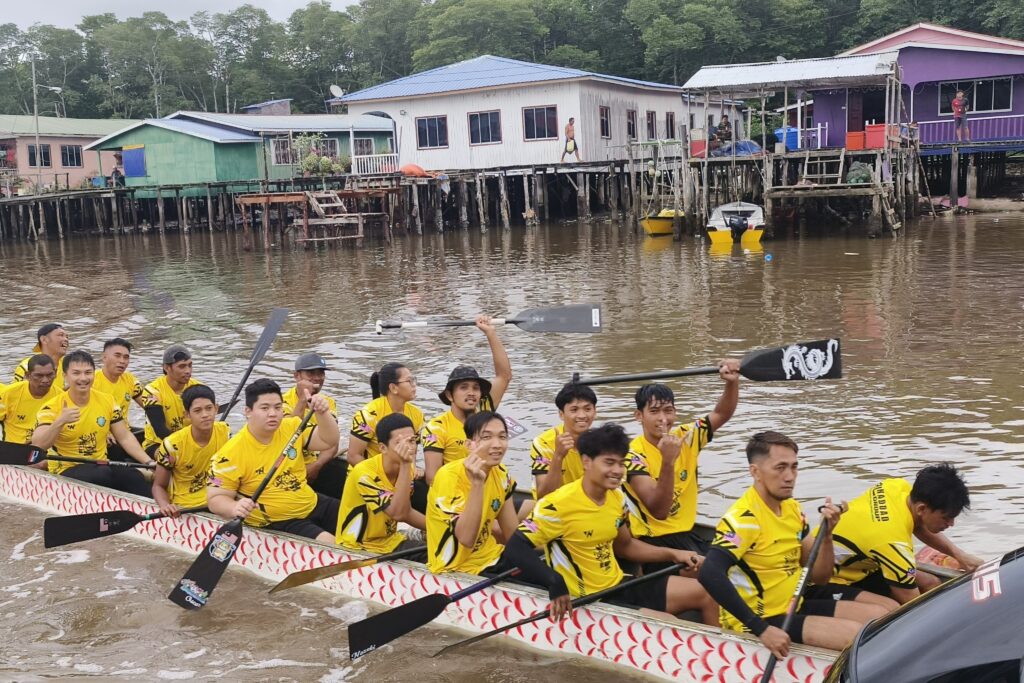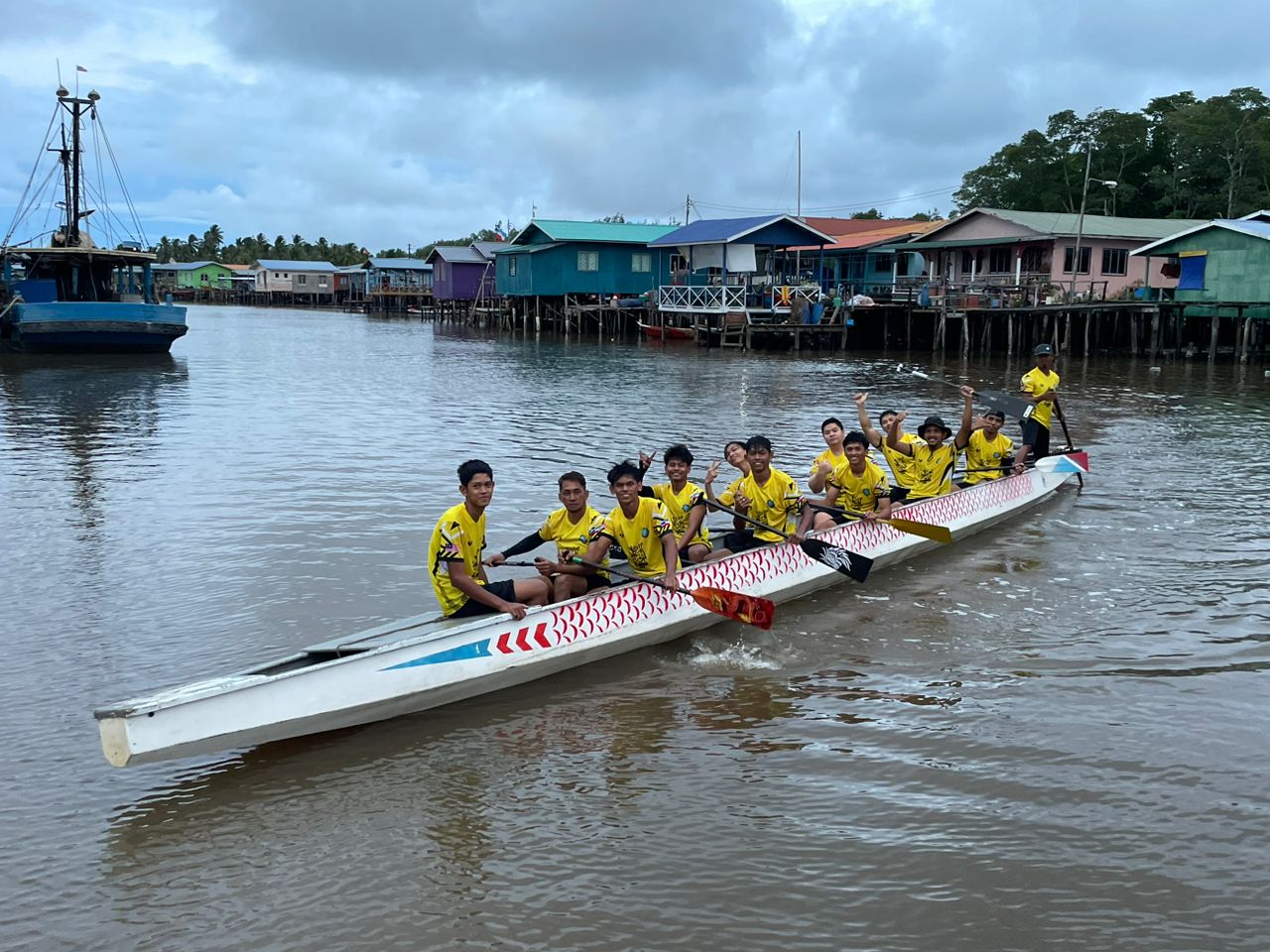SANDAKAN – Though Chinese in origin, dragon boat racing in Sabah is no longer under the purview of the Chinese due to the different priorities and local geography here.
Local entrepreneur Jason Pang and friend Oscar Vun Chun Haun were the only two Chinese participants from the Sabah Dragonboat Association who competed in last year’s Sarawak International Dragonboat Race (SIDBR).
They were also the only ones in their team not from Kg Tanjung Aru, a water village about 15 minutes away by boat from Sandakan town.
The village residents are of Bruneian descent, and according to the Sabah State Archives Department they originated from the time of the Brunei Sultanate who ruled Sabah before the British arrived.

As all their other teammates are from the water village, Pang and Vun go there almost daily to train.
The residents of the village take to dragon boat racing naturally, having lived on water their whole lives.
“They travel everywhere by boat. They row their boats during their free time and they would swim around their village. Most of them are fishermen so they work on boats. In the evening during their free time, they would spend time racing with their friends’ boats. They are naturals at the sport,” Pang told Scoop.
He also said Sabah’s geographic and demographic factors are reasons why dragon boat racing here is seeing less and less participation from Chinese youths.
Besides their teammates from the water village being natural boaters, Chinese youths are also more interested in pursuing other careers. Pang and Vun however, have flexible working hours and are thus able to have time to train.
“It really is not about continuing the (Chinese) culture and heritage here, because in Sabah a lot of the Tionghua people here have moved away from the water (sea),” Pang said.
“So logically, the people who live on the water such as the Tanjung Aru folk, who so happen are not of Chinese ethnicity, would be attracted to join dragon boat racing as a hobby.”
Pang’s personal reasons for dragon boat racing are simply his love for it and the opportunity to hone strength, agility and stamina.

“That the sport is part of my heritage is a bonus and I did not join the sport because of it,” he added.
Pang and Vun are with the Al-Hadad dragon boat team, which is the only team from Sabah registered with the Malaysian Dragon Boat Federation, according to Sabah Dragon Boat Association president Mohd Supri Mangsor.
Al-Hadad has about 50 active members, most of whom are Kg Tanjung Aru residents, including Mohd Supri.
“Tanjung Aru villagers have been racing paddle boats for fun for decades,” he said.
“In 2010, when we saw that something official like dragon boat competitions existed, we joined and formed a team. We were excellent and have been champions in a lot of races, including international races.”
In the beginning, team members did not have the budget to buy a proper paddle and made their own paddles from wood.
“When we went to competitions, we realised that other teams were using special paddles, proper ones, and we borrowed these paddles from other teams.
“However, we had an advantage because the paddles that we made ourselves and trained with were heavier, so we performed better with lighter paddles.
“Now, many of us have bought proper paddles, but we still use our self-made paddles for training to enhance the difficulty and improve our strength,” Mohd Supri said.
The team wishes it had more Chinese members, he added, because the Tanjung Aru folk recognise dragon boat racing as a Chinese traditional sport.

“So when Pang and Vun approached us and said they wanted to join, we were thrilled. We were also very impressed with their motivation and dedication in training because they were the only ones who had to travel to our training site via boat from the Sandakan mainland.
“We hope for more young and energetic members to join our team in the future,” Mohd Supri said.
Pang, meanwhile, acknowledges that many Chinese youth in Sabah prefer to spend their time working and earning money.
Thus, even the heritage sport of lion dancing does not attract many Chinese participants nowadays.
“I think a lot of (Chinese) people may not have the time to train, and having to perform lion dances during Chinese New Year would mean spending less time with their family.”
Pang said keeping heritage sports alive also costs money, as capital is needed to buy lion heads and to pay trainers.
“If we can understand these matters, then we would understand why there is less and less involvement among the Chinese in traditional sports,” he said.
Nevertheless, Pang said that he hoped to see more people, regardless of their race, continuing the tradition of the dragon boat race.
“It is not a race or ethnic issue. I just hope that the sport will not die in Sabah because it is a very unique and excellent sport which makes Malaysia more colourful and diverse, and I hope that Sabah will continue to be a part of it.
“As long as there are still people who love the sport and spend time on it, the tradition never really dies; the players’ ethnicities do not matter,” he added. – February 26, 2024


